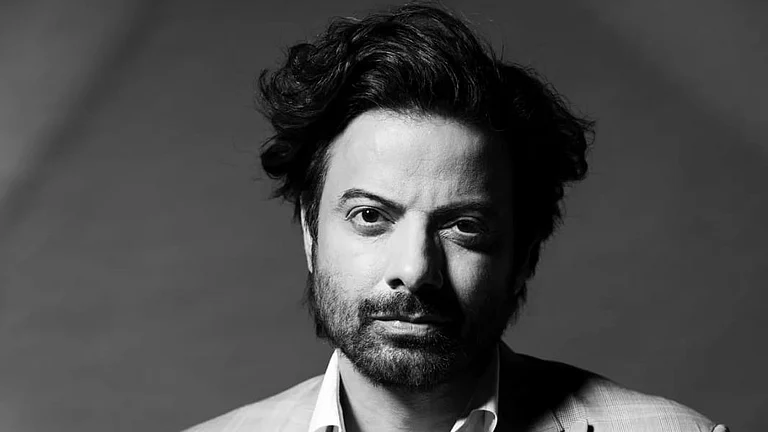In comments that are set to fuel speculations about Israeli plans for a post-Hamas governance structure in the Gaza Strip, Israeli Prime Minister Benjamin Netanyahu on Friday said that the country's military would have the security control in Gaza and no external or international force would be allowed to take charge of the region.
The stated Israeli objective of the ongoing war with Hamas is the defeat of the group and removal from power in Gaza. There is, however, uncertainty about the post-war governance structure in Gaza. Hamas, a designated terrorist group, has run the government in Gaza since 2007.
Netanyahu's comments on Friday appear to be in line with his comments on Tuesday when he said that Israel could have "overall security responsibility" in Gaza once the war ends. That comment was interpreted by some to mean an occupation and by others to mean a West Bank-like arrangement.
In a meeting with the mayors of southern Israeli areas, which bore the brunt of the Hamas offensive on October 7, Netanyahu said that no international force would be allowed to take charge of Gaza after Hamas has been defeated. This appeared to be a response to suggestions from some quarters that an international coalition of countries, likely from the Arab World, could take over Gaza after the war until a post-Hamas governance structure is firmed up.
"IDF forces will maintain control in the Strip; we will not hand it over to external forces...There will be Israeli security control over the Gaza Strip, including complete disarmament, to ensure that there is no longer a threat from Gaza to the citizens of Israel," said Netanyahu to the mayors, according to Israeli outlet Ynet News.
Netanyahu did not elaborate on his comment. He also did not elaborate on what "overall security responsibility" could mean that he mentioned in Tuesday in an interview with ABC News. He told the outlet, "I think Israel will, for an indefinite period will have the overall security responsibility because we’ve seen what happens when we don't have it. When we don’t have that security responsibility, what we have is the eruption of Hamas terror on a scale that we couldn’t imagine."
Hours before the comment to the mayors, however, Netanyahu had said that Israel does not wish to occupy Gaza after the war. This is a line that Israeli officials have repeated multiple times, including Defence Minister and fellow War Cabinet Minister Yoav Gallant.
"We don't seek to govern Gaza. We don't seek to occupy Gaza. What we seek is to give it and us is a better future and to the entire Middle East. That requires defeating Hamas. I have set goals. I didn’t set a timetable because it can take more time. I wish it’ll take a little time, but we’re proceeding step by step, reducing our casualties in the process, trying to reduce and minimise civilian casualties and maximise the casualties of the Hamas terrorists, and so far I think it's proceeding well," said Netanyahu in an interview with Fox News.
Such comments have been interpreted by some as an indication of an Israeli occupation or an occupation for a transitional period. It has also been understood that it could mean the implementation of a West Bank-like governance structure where either the internationally recognised-Palestinian Authority (PA) —which partially governs West Bank— or a PA-like body would govern the region in coordination with Israel.
Last month, Israeli Defence Minister Yoav Gallant told an Israeli parliamentary committee that the country would give up the "responsibility for life in the Gaza Strip" after the war. While Israel has not governed Gaza since 2005, it has provided it with up to a third of its water supply and some electricity as well. Gallant suggested that post-war Gaza would have no relationship with Israel.
Gallant further hinted at the planned withdrawal from Gazan affairs. He said that the war would be fought in three phases: In the first phase, Israel would destroy Hamas's infrastructure; in the second phase, Israel would launch "operations at lower intensity" to eliminate "pockets of resistance"; the third phase would "require the removal of Israel’s responsibility for life in the Gaza Strip, and the establishment of a new security reality for the citizens of Israel".
Following Netanyahu’s interview to ABC, a senior Israeli official was quoted as saying that there was no intention to "reoccupy Gaza or control it for a long time".
"It’s not Israel’s intention to reoccupy Gaza or control it for a long time. Our operation is not open-ended. The idea behind Israel going in militarily is to destroy Hamas’s ability to threaten us. We understand that will take time and that, even if we complete this phase of our military operation, we’ll still have to take some action against their remaining military infrastructure," said the senior Israeli official to The Jerusalem Post on the condition of anonymity.
The Israel-Hamas War began on October 7 when Hamas and allied groups attacked Israel and went on a rampage across southern part of the country under the cover of around 3,000 rockets that rained all over the country. The Israeli government says at least 1,600 were killed, around 6,900 were injured, and at least 140 were abducted and taken to Gaza as hostages. The southern region, whose mayors Netanyahu was meeting, bore the brunt of the attacks where as many 3,000 Hamas attackers attacked communities after communities. One of the mayors in the region, Sha'ar Hanegev Council head Ofir Liebstein, was also killed while defending the town from the Hamas attackers.
In response to the Hamas-led attack, Israel launched intense aerial and bombardment of Gaza to take down Hamas leaders and facilities as part of the long war to defeat Hamas and remove it from Gaza's leadership. While Hamas has been hit hard, widespread civilian casualties have been reported in Gaza, with the Hamas-run Gazan authorities saying over 11,000 have been killed, over 4,000 of whom are children. Moreover, around 1.5 million Palestinians are estimated to have been displaced internally in Gaza which is short of food, medicines, and fuel amid a land blockade.
The grave humanitarian crisis in Gaza has called for an immediate ceasefire and has diluted the international support for Israel in its war against Hamas as massive rallies frequently take place in the West against the Israeli war efforts. Israel has, however, rejected calls for ceasefires, but has so far accepted the US-led Western suggestions to reduce the invasion to a narrower, focussed ground operation, enable more humanitarian aid into Gaza, and institute daily pauses in attacks for humanitarian purposes.


























